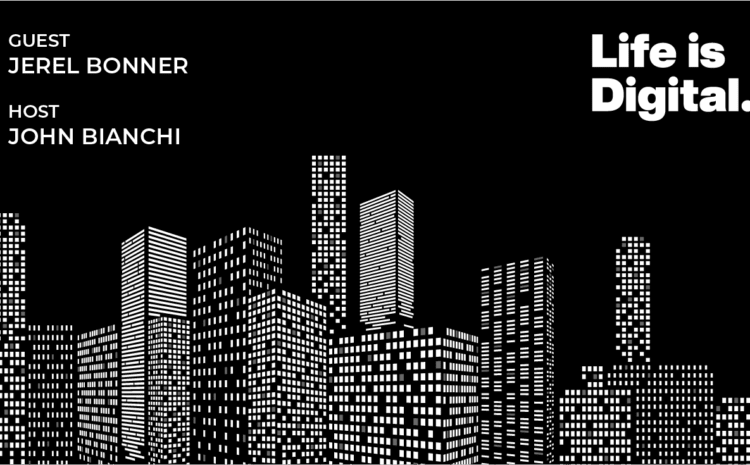What Does a Day Well Spent Mean To You? – A unique conversation with Jerel Bonner ‘Human Behavior Awareness’ consultant.
John: Hey everyone, welcome to Life is Digital. I am your host, John Bianchi, get ready to learn about digital marketing, as we share our knowledge and perspectives on current trends, best practices and actionable tips to help you grow your business in the digital age. Well, I am excited to have Jerel Bonner on with me this morning. Jerel is the co-founder of Corralling Chaos. Corralling Chaos is a catalyst for authentic leadership and high-performing teams, he helps companies and individuals align with purpose and branding in their organizations. Jerel, It’s a pleasure to have you on this morning.
Meet Jerel Bonner, Co-Founder of Corralling Chaos
Jerel: Thank you for having me, John. It’s always a pleasure to talk to people that wanna spread the word of helping people get better.
John: Absolutely, and I think this is a fascinating topic, especially as business and business industries are changing where obviously in this new post-COVID time, where we have individuals and teams being more fragmented, yet maybe even working more closely connected through digital tools, that this idea of accountability and ownership comes up, as well as making sure that people are reinventing themselves and staying relevant in this digital age. You had shared a couple of key stats with me before hopping on this morning, which I thought might be of value and interest to our audience, could you share some of those key industry facts.
Jerel: Yeah, sure. So in Thomas Friedman’s latest book is, “Thank You for Being Late.” He talked about how executive admins are… 40% of them are no longer qualified for the job they’re doing today, even though they are employed for doing it, and he writes that, imagine somebody working today re-applying for their job tomorrow and being denied the job because they don’t have a bachelor’s degree, that’s just… Insane. And one of our clients we’re working with, they were helping them think about the future of work, and they’re starting to realize that, Hey, you know what, bots can write their research papers, what’s your next job if the bots are writing your research papers and what’s quite interesting about that, I said to this person, when they share that with me, I was like, Did you know that most of the sports stories and its scores and assemblies are all bot written? The stock market press releases on earning stock earnings are all bot reported.
John: That’s really fascinating. So really what you’re touching on in terms of the future and work is the digital transformation as it applies not just to tools where obviously we all use email, but now we have messaging tools like Slack and project management tools like Monday, this really now comes down to the changing potential career opportunities for individuals that have been trained in certain career tracks. Everyone is supposed to have a personal brand and beyond purpose for the organization, maybe you can share a little bit more about what that means to have that personal… Personal mission statement, and then how we drive accountability and relevancy in that area.
What does it mean to have a personal mission statement?
Jerel: Great question, John. So your personal mission statement is really kind of fading now, and it was something that was very sparked heavily in the mid-90s after Stephen Covey wrote his book, The Seven Habits, a highly effective people, and he said people should have a mission statement, and he basically focused that around the process of, Hey, you wanna make sure that when you get to the top of the mountain, you’re on the top of the right mountain. And today the mountains are moving and they’re moving in ways we never thought of. So at the end of the day, every individual needs to think about… If I get up this morning, Am I gonna do the things that make me happy, whether I get paid for them or not. Because at the end of the day, if you don’t have a happy day, every day is not happy, or… Of course, not every day is gonna be perfect, but if you’re not getting up and doing the things you love to do, well, you’re not gonna wanna do them better, and you’re not gonna be able to be happy with your career and in your life, and at the end of the day, you wanna be happy with your life, you don’t wanna be happy with the money in the bank, ’cause you can’t take the money in the bank with you…
John: Absolutely, I think that concept of fulfillment in your work is sometimes lost on today’s high-paced, high pressure environments, especially with the digital age, making everything instantaneous and increasing that need for personal fulfillment, but we seem to have a less of that. What do you think is blocking individuals from achieving that balance in their work-life… Work-life balance has obviously been something that’s been bandied about or a lot… It’s a key term that people are trying to achieve and structure a company like we work, that has brought that kind of collaborative environment in to change the traditional cubicle structure or a corporate structure. What do you think are some things that are actually stopping us potentially from achieving that fulfillment both in the career and then in our personal lives?
What are things that stop us from achieving fulfillment in both your career and personal lives?
Jerel: So that’s a great question, and what’s blocking people is they’re not actually writing it down and saying, What will make me happy… They don’t get up in the morning and go, Am I gonna be happy? Today, Am I gonna do the things that are gonna make me happy? And I get a lot of heat for this because I say to people, If you wanna be a great mother and father… That’s fantastic. I really think that’s honorable, but admit it, just step up and say, You know what, as long as I make my 70000 a year, which is the magical number that says If you make 70000 a year or more, you can have a nice lifestyle, stock away enough money take care of two kids, put them through college, pay your mortgage. If that’s the life you want, and you know what, there’s nothing wrong with that life, billions of people do it every year, right? So if you want it, just say That’s what I want. However, most people wanna climb the ladder and they wanna have that life, and that is a struggle that most people are not thinking about the sacrifice that they have to make to get that. So I like to use my life as an example. I’m a single guy, I was married once and I don’t have kids, I’m not in a relationship now. And that’s because I lived in China for 14 years, and that living in China gave me meant… I had to sacrifice something, and I had relationships in China, I had great business activities, however, I sacrificed a lot of staying up to-date with how the United States transitioned into a new culture. I missed a lot of sporting events, I missed a lot of musical events, but at the end of the day, I get to say to people… I went to 45 different places in China, I went to all over Asia, and I’ve said this to people before, John, if I die tomorrow, I’m content with what I’ve achieved. ’cause it’s what I wanted. I’m not in a place where I’m like, Oh, what am I gonna miss out? I’m like, I don’t have to do anything else ’cause I’m done it what I’ve wanted to make me happy.
John: I think that’s such a fascinating concept, and I remember, I think about 10 years ago, this concept was showing up in a number of articles of wanderlust, right. Where people were rethinking how and where they would wanna be engaged and connected and see more of the world, and I think that that applies, and I think as we have this transition in work, as work not necessarily being the end goal, but it’s the means to the end, I love what you’re saying about how you have to kinda think about what your priorities and sacrifices will be, I wonder if that’s something you could touch on in terms of how you can help people to make that decision, like you said, if this is something you wanna do and you wanna be happy doing this, then own that and be honest about that. Does that connect to that accountability idea that you were speaking about earlier?
Jerel: Yeah, it sure does. You’re spot on there, because when you get up in the morning and you say, I’m gonna go do eight hours of great work from my employer so I can continue to pay my rent and put my kids through school and make sure they got healthcare… That’s very noble. And to say, I know this is a small… This is a small sacrifice of eight hours, nine hours, and I’m gonna be nice to people, ’cause I wanna get through the day and I wanna help people, because it’s letting me be a great father, be a great mother, and if my career goes up… Great, that’s fine. Likewise, if you’re gonna be chasing this, you wanna be this big corporate executive that oversees 10000 people and changes the world, well, then you need to say, Well, I can’t do it all… In today’s world, it’s way too hard to stay up to date and keep moving as fast as the world is moving. I’m talking with one of my clients and I said to them, there challenges, they say, Our employees keep saying, We don’t know when we have time to learn during the day. I can’t figure out where to steal 30 minutes to listen to a podcast or read a book, and I’m like, Who said they had to listen to a podcast or read a book, they just have to pay attention to what they’re hearing in the moment and say, Oh, that was something I learned, and how can I repeat it? Right, and if they’re not… And how can I learn that… See that I’m learning, I’m expanding my learning capabilities in the moment… So for example, when I was on a call with a client the other day and they said, We’re gonna have to spend 90000 for D And I, strategy planning for 2021. How many people were thinking about spending $90000, it’s a small company. Less than 100 people. How many of them in January, had a line out in budget diversity and inclusion. So there’s $90000 that they’re shifting. And that just went right to my brain and said, “Remember that fact”, ’cause you gotta ask other customers, what are you spending on D and I this year, or how has that impacted your budget, ’cause if they spend 90000 on D and I, they’re not spending, There’s 90000 less for BOS. And there’s not… Or BOS is it? And sorry if I got your company name wrong, there’s $90000 less for Corralling Chaos and $90000 less for BOS, and that means we gotta figure out how do we get them to find $90000 for us, right? So people have to be learning all the time… One of the things I do to help our companies stay relevant and share and stay in the… Stay in front of our customers. I do a lot of quote sharing, so today the term is, we wanna see leaders model the behavior, get the leader to model the behavior they want their employees… Well, actually, John Wooden, the famous UCLA basketball coach, who won 10 NCAA Championships actually said, the best way to be a great leader is to be the leader you want others to be, and lead by example. So that’s not new, right so everybody is like, “new model of behavior”, “new models of behaviors new”… Guess what, it’s not… So I kinda wrote in my LinkedIn update… Some things change, then some things don’t change, right, that concept of be the leader, being a leader, lead by example is still relevant 20 years later. So does that answer your question?
John: It does, and I love what you’re saying there, that it’s the core, the core things, the core processes have never changed, obviously in human interaction and communication, there are some key concepts and core pieces that are always gonna help us move to a better place. Move our organizations forward. Work on ourselves as we have personal development, those things will never change. Honestly, in today’s world, all that has is the means of how we do that, we have an opportunity to communicate with more people on quite a more rapid basis and more available basis now than ever before, like you said, even spending time in China, you’ve been able to go to those different places where maybe a 100 years ago that wasn’t even possible, so I think today as the world expands, it’s also getting more connected and even this kind of shrinking our ability to be more connected in different areas, and that makes a lot of sense of what you’re saying, you know, Jerel, this has been a really fantastic conversation, I wonder if you could leave the audience with a few key takeaways that kind of encapsulate some of these topics that we’ve touched on today.
Key takeaways
Jerel: So before I do that, I’d like to share a story with you about what you just said about what happened 100 years ago and how it’s different today and stuff. So sometimes when I talk to clients, I say to them, and who was the first person to climb Mount Everest and what year? 1953, and I can’t remember the guy’s name now, I’m gonna blow this. So anyhow, 1953 was two people climbed Mount Everest, Between 1953 and 1993, about 120 people climbed Mount Everest, but this year, nobody climbed it ’cause of the pandemic, last year, 800 people climbed Mount Everest. And back to your point, what was the difference? There were the sherpas to take them up, the base camps were there, all the equipments around, you can get a trainer to get you into shape to deal with the air and you can buy all the equipment you want and need to climb Mount Everest. The only thing different is, do you wanna do it? Right, so now to answer your question, people need to say, What do I wanna do? ’cause you can do it if you put your mind to it, and you need to say, Okay, if I wanna do this, how good am I today? And how good will I be tomorrow? And what do I need to learn to be better? To add it tomorrow. So we do a lot of simple things regularly, because of the pandemic, I started walking and I walked… I started off with 10-minute walks, 20-minute walks. Next thing I know it, I’m doing 120 miles a month. Right, then I turned around and said, Okay, well, I used to be a spin instructor, I wanna get back to riding. Right, so I went back to riding, I got a bike and again, it was a half an hour ride or 45-minute ride, now I’m doing 15 miles a day, and now I’m doing between walking every other day and riding every other day I’m coming up on 300 miles a month, I’ve done almost a thousand miles of walking and riding since April. Why? Because I wanted to do it, it’s like, Okay, the pandemics here, I don’t wanna sit here, I can’t sit in the house all day, so I gotta do something different. It’s the same thing if you wanna grow, get up that ladder, you need to sit down with your kids and say, This is the sacrifice we’re gonna make so you can go to this school, and if you wanna get up that ladder and change the world. I know a guy here in Chapel Hill, who actually started a company where you take a… If you pick up a plastic bottle from the street and throw it away and you take a picture of it, it weighs the bottle, and it adds that bottle into a number of how many people have thrown away plastic bottles today, and how many people have picked up plastic bottles this month and this year, and he’s tracking all the pollution people are picking up off the street and throwing away, and the name of the app is called litterati [Spells out the name]. And so that’s what he wants to do. That’s great, right? He’s helping the world, he’s got everybody doing an app, so you pick up three soda cans, take pictures of the three scans, throw it away. Right. You’ve done your part, and he’s done his part by helping people spread the word so that… Is he gonna make millions of dollars? Who knows, but he’s doing something for the world. Right.
John: Absolutely. And I think as we close today, I think that’s really important, this idea of fulfillment, but also the community aspect, that when you’re fulfilled in what you’re doing and you’re working towards the greater good, whether that is, like you said, in the environment or the world or inside your organization that’s gonna raise all boats, right, everyone around you is gonna be impacted by your ability to do the best job that you can do because you’re fulfilled in your work.
Jerel: Yeah, that’s right. If you can go home happy and say, I’m gonna sleep well, ’cause I did a good job and I didn’t get into fights with anybody and I didn’t have any emotional issues, I’m gonna be stronger to communicate with my partner and my kids, and I’ll enjoy the evening more then that’s a day well spent, ’cause nobody knows if we’re gonna get up in the morning, right, so… We all think we’re gonna live to 100, but there’s… Nobody can go to sleep tonight saying, I’ll wake up tomorrow morning, we’ve seen too many news stories about athletes and great shape that… Don’t wake up in the morning, right?
John: Sure, sure. Well, Jerel, I really appreciate having you on board for this conversation, I think this was a really unique conversation with me and for our audience. I appreciate you taking the time to talk with us today.
Jerel: Well, thank you for having me, John, and it was a pleasure and I look forward to talking to you again in the future.
John: Absolutely, and I appreciate you, the audience for joining us on this episode of Life is Digital. Once again, I am your host, John Bianchi. Please remember to rate, review and subscribe to the show until next time. Don’t stop marketing.














Write a Comment